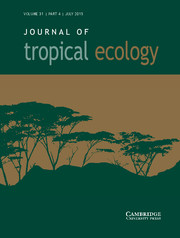Crossref Citations
This article has been cited by the following publications. This list is generated based on data provided by
Crossref.
Luiselli, Luca
2007.
Nonrandom co‐occurrence patterns of rainforest chameleons.
African Journal of Ecology,
Vol. 45,
Issue. 3,
p.
336.
Luiselli, Luca
Eniang, Edem A.
and
Akani, Godfrey C.
2007.
Non‐random structure of a guild of geckos in a fragmented, human‐altered, African rainforest.
Ecological Research,
Vol. 22,
Issue. 4,
p.
593.
Luiselli, Luca
Filippi, Ernesto
and
Di Lena, Emanuela
2007.
Ecological Relationships between Sympatric Vipera Aspis and Vipera Ursinii in High-Altitude Habitats of Central Italy.
Journal of Herpetology,
Vol. 41,
Issue. 3,
p.
378.
Akani, G. C.
Luiselli, L.
Eniang, E. A.
and
Rugiero, L.
2008.
Life in the tropical suburbs: Food type partitioning among sympatric African house snakes of the genusLamprophis(Colubridae).
Italian Journal of Zoology,
Vol. 75,
Issue. 4,
p.
395.
Luiselli, Luca
2008.
Community ecology of African reptiles: historical perspective and a meta‐analysis using null models.
African Journal of Ecology,
Vol. 46,
Issue. 3,
p.
384.
Hasui, Érica
Gomes, Verônica Souza da Mota
Kiefer, Mara Cíntia
Tamashiro, Jorge
and
Silva, Wesley Rodrigues
2009.
Spatial and seasonal variation in niche partitioning between blue manakin (Chiroxiphia caudata) and greenish schiffornis (Schiffornis virescens) in southeastern Brazil.
Studies on Neotropical Fauna and Environment,
Vol. 44,
Issue. 3,
p.
149.
Wasko, Dennis K.
and
Sasa, Mahmood
2009.
Activity Patterns of a Neotropical Ambush Predator: Spatial Ecology of the Fer‐de‐lance (Bothrops asper, Serpentes: Viperidae) in Costa Rica.
Biotropica,
Vol. 41,
Issue. 2,
p.
241.
Willson, John D.
Winne, Christopher T.
Pilgrim, Melissa A.
Romanek, Christopher S.
and
Gibbons, J. Whitfield
2010.
Seasonal variation in terrestrial resource subsidies influences trophic niche width and overlap in two aquatic snake species: a stable isotope approach.
Oikos,
Vol. 119,
Issue. 7,
p.
1161.
Luiselli, Luca
Akani, Godfrey C.
Ebere, Nwabueze
Rugiero, Lorenzo
Vignoli, Leonardo
Angelici, Francesco M.
Eniang, Edem A.
and
Behangana, Mathias
2011.
Food Habits of a Pelomedusid Turtle, Pelomedusa subrufa, in Tropical Africa (Nigeria): The Effects of Sex, Body Size, Season, and Site.
Chelonian Conservation and Biology,
Vol. 10,
Issue. 1,
p.
138.
Amori, Giovanni
and
Luiselli, Luca
2011.
Small mammal community structure in West Africa: a meta-analysis using null models.
African Journal of Ecology,
Vol. 49,
Issue. 4,
p.
418.
Del Vecchio, Silvia
Burke, Russell L.
Rugiero, Lorenzo
Capula, Massimo
and
Luiselli, Luca
2011.
Seasonal Changes in the Diet of Testudo hermanni hermanni in Central Italy.
Herpetologica,
Vol. 67,
Issue. 3,
p.
236.
Van Wilgen, Nicola J.
and
Richardson, David M.
2011.
Is phylogenetic relatedness to native species important for the establishment of reptiles introduced to California and Florida?.
Diversity and Distributions,
Vol. 17,
Issue. 1,
p.
172.
Pearson, Steven H.
Avery, Harold W.
Kilham, Susan S.
Velinsky, David J.
Spotila, James R.
and
Roberts, David L.
2013.
Stable Isotopes of C and N Reveal Habitat Dependent Dietary Overlap between Native and Introduced Turtles Pseudemys rubriventris and Trachemys scripta.
PLoS ONE,
Vol. 8,
Issue. 5,
p.
e62891.
Boström-Einarsson, Lisa
Bonin, Mary C.
Munday, Philip L.
and
Jones, Geoffrey P.
2013.
Strong intraspecific competition and habitat selectivity influence abundance of a coral-dwelling damselfish.
Journal of Experimental Marine Biology and Ecology,
Vol. 448,
Issue. ,
p.
85.
Steen, David A.
McClure, Christopher J. W.
Brock, Jean C.
Craig Rudolph, D.
Pierce, Josh B.
Lee, James R.
Jeffrey Humphries, W.
Gregory, Beau B.
Sutton, William B.
Smith, Lora L.
Baxley, Danna L.
Stevenson, Dirk J.
Guyer, Craig
and
Meiri, Shai
2014.
Snake co‐occurrence patterns are best explained by habitat and hypothesized effects of interspecific interactions.
Journal of Animal Ecology,
Vol. 83,
Issue. 1,
p.
286.
Baini, Francesco
Bologna, Marco A.
Pitzalis, Monica
Taiti, Stefano
Vigna Taglianti, Augusto
and
Zapparoli, Marzio
2014.
Assessing patterns of co-occurrence and nestedness of arthropod assemblages in an artificial–natural Mediterranean forest mosaic (Isopoda Oniscidea, Coleoptera Carabidae).
Rendiconti Lincei,
Vol. 25,
Issue. 3,
p.
339.
Hoinsoudé Segniagbeto, Gabriel
Eniang, Edem A.
Petrozzi, Fabio
Vignoli, Leonardo
Dendi, Daniele
Akani, Godfrey C.
and
Luiselli, Luca
2015.
Aspects of the ecology of the tortoiseKinixys nogueyi(Lataste, 1886) in Togo and Nigeria (West Africa).
Tropical Zoology,
Vol. 28,
Issue. 1,
p.
1.
Aloise, Gaetano
Cagnin, Mara
and
Luiselli, Luca
2015.
Co-occurrence patterns in independently evolved groups of Mediterranean insectivorous vertebrates (lizards and shrews).
Amphibia-Reptilia,
Vol. 36,
Issue. 3,
p.
233.
Vignoli, Leonardo
Bissattini, Alessandra Maria
and
Luiselli, Luca
2016.
Food partitioning and the evolution of non-randomly structured communities in tailed amphibians: a worldwide systematic review.
Biological Journal of the Linnean Society,
Méndez-Narváez, Javier
and
Bolívar-G, Wilmar
2016.
Complementary Ecological Approaches to Understand Decreases in Frog Diversity in Altered Andean Ecosystems.
South American Journal of Herpetology,
Vol. 11,
Issue. 1,
p.
1.


